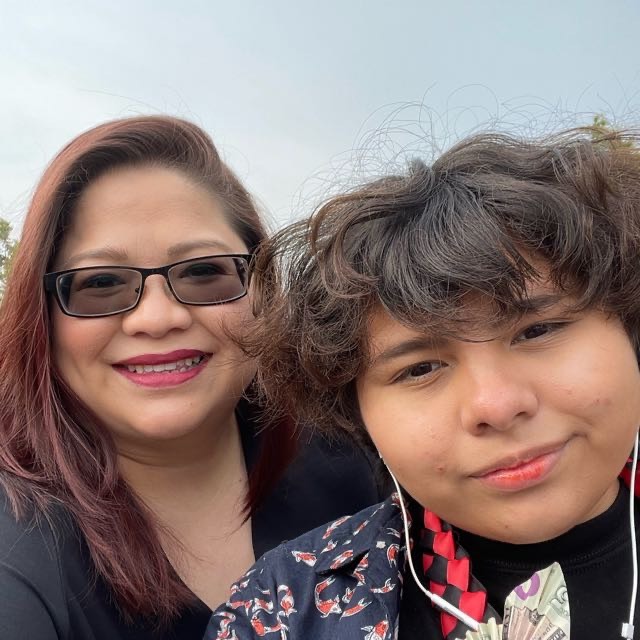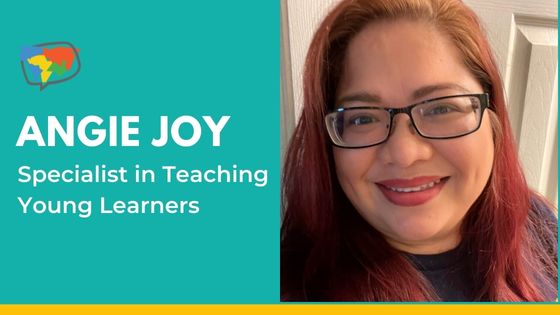What keeps you going as an English teacher? For Angie Joy Certeza, it’s watching her young learners grow every day. After a stint in teaching kids and special education students in person, she transitioned to teaching English online. She shares how moving to a virtual classroom helped her while overcoming challenging moments in her life, how pursuing a more advanced TEFL certification has opened more doors for her as an English teacher, and how she keeps her youngsters focused while learning English online.
Hi, Angie! Can you tell us a bit about yourself?
I’m 42. I’m originally from Guam, but I’ve been living in the States for 18 years. I have a Bachelor’s degree in Child Development and a Master’s degree in Early Childhood Education with a Curriculum Specialization. I also have a certificate for BCBA to work with kids with autism, so I do specialize in special education with kids. I’ve been teaching for more than five years and maybe about two years online. I love teaching. It’s always been my path.
Read about another Bridge alumni teaching special needs students ESL.
How did your English teaching journey begin?
When I was in high school, I went to a teaching program for Phi Delta Kappa. I was chosen out of 150 people from all over the world, one of the few from Guam who attended. That was when I fell in love with becoming a teacher. But, unfortunately, life has its twists and turns, so I always had to work a job that supported me while I was going to school.
When I was working with kids on the autism spectrum here in Mississippi, I was injured; therefore, I couldn’t go back to teaching them in person. So, I decided to move forward with English teaching, which was always on the back burner. I figured it was time for me to go this route and teach English online.

How did your experience teaching kids shape you as an English teacher?
When you’re a special ed teacher, you have to teach students the basics, just like in English teaching, and you have to help them to become more vocal.
You have to help them to understand the physical basis of communication and the basic things that they have to do in their lives. English teaching is similar in some ways because, although the kids do understand, they’re learning a totally new language. In a way, it’s kind of a disability. They have to learn and communicate in a different way.
What do you like best about teaching young learners?
I love to see a spark in kids when they finally learn and grow. I worked with a two-year-old child with autism who didn’t know how to potty, didn’t know how to speak, and always used aggression. Six months later, she spoke more than 500 words, learned to potty, learned to eat, learned to communicate, and made good friends. So, just seeing sparks like that and seeing students thrive makes me more passionate.
That’s also why I love English teaching. When I started teaching online, I had a kid who really did not like to speak. By the end of the six months that I had her, her mom told me, “My kid really loves coming to class, and she never liked to come to class before, and she’s speaking more English in the house!” I was just very intrigued. I didn’t think that I was doing the best job. Sometimes, you’re your own worst critic, but when you have so much passion and you want people to learn, it gives that spark to that child, so they’re willing to communicate.
Honestly, getting out of bed to get online and teach these kids also actually drives me to have a healthier life. I love that about teaching – a simple, passionate person can make kids thrive.
Interested in teaching young learners? Learn about Bridge’s Teaching English to Young Learners Specialized Certification.
How has online English teaching changed your life?
I was actually in a wheelchair when I first started teaching online, and I was going through a lot of things medically, and teaching made me healthier because it made me feel like I had something to work hard for to get better.
Getting back to normal has a lot to do with teaching because it gives me that extra energy. It drives me to wake up, and I always look forward to talking to the kids online.

You’ve just landed an online English teaching job – congrats! How did you find this job?
The job was advertised on Bridge’s Job Board, as well as in the job advising module [of the online TEFL certification course]. I used that link and I actually created my own profile and uploaded my resume, my references, and other qualifications. I posted my profile at the beginning of August, and then I started looking at online English teacher jobs. Not even three weeks later, I got an email. I was very happy about it because it was actually the one that I wanted to get!
Can you tell us more about this new job?
BEILS is based out of Turkey. I will be teaching up to 14 students. One thing I love about it is that I’ll have the same set of kids for the whole duration of my contract. The number of their students also keeps growing. Right now, they have 10,000 students and 100 teachers, but before they hired me, they only had 4,000 students and 20 teachers.
They also have room to grow. If you work more than 25 to 30 hours and you’re consistent, they look into getting you a mentorship or doing more with the company.
Another thing I love about them is that they have their own curriculum, and it matches what the kids are doing in Turkey. So, I just had to adjust to having more kids and jumping between screens!
Read more about the types of jobs you can get with a TEFL/TESOL certificate.
What is your strategy for keeping kids attentive in a group class?
My first strategy is to really relate to them. For example, my students love food. So, I want them to give me a recipe from Turkey, and I can make it. If I’m interested in their culture, they’re going to be interested in what I’m trying to say.
On top of that, I also make sure to navigate their communication. So, once I start seeing that one student is not talking, I call on them and say, “What do you think about it?” It’s just about getting them more involved and continually speaking.
Learn more about teaching English online to groups.
Can you share a memorable moment you’ve had in class?
I had a student who was a very smart child. He was so smart, to the point where he could complete a 25-minute task in five minutes or ten minutes, and then I’d have these 15-minute talks with him. He loved Pokémon, so I would make sure we talked about Pokémon. And he was actually in a yo-yo competition and he would demonstrate all of his yo-yo tricks. It was amazing. It was so great that he would always share different aspects of his life with me.
I also had this other child who loved animals so much that she had a turtle, a dog, and a cat, and every day, we’d be talking about the animals and I would show her my rabbit, my hedgehog, and my dog. That would get her to stay focused on the assignment because she would finish one section, and then I’d show her the hedgehog. Then, I’d take the animal away and I would say, “Do you want to see a rabbit?” She’d say, “Yes!” I’d say, “Okay. We’ll finish this section, and then we’ll see a rabbit.” So, that’s how I did it, and she got the work done!

You took the 120-Hour Master Certificate course and the Specialized course in Teaching English Online. Why did you decide to take these courses?
I decided to take these courses because when I first started working with EF, they only required a 40-hour certification because I had a master’s degree. But when I went online, I saw that a lot of opportunities to teach overseas and teach more English, which required at least 120 hours.
Nevertheless, what settled me on the Bridge program was the focus of the courses and that it was affordable for me as well. I was also able to pay through PayPal and divide my payments. So, it was something that worked out for me because as a single parent, it was really hard financially.
I also love the program so much that I actually introduced it to my goddaughter, who is currently taking the IDELTOnline™, and she loves the program too!
How have these courses helped you professionally?
Now that I’ve gotten this job and an opportunity to also work overseas, I don’t have to go and get another certificate. The only other certificate that they do recommend, if I want to teach adults, is the Specialized course in Teaching Business English. So, I’ll probably be doing it next month.
The courses are also very detailed. Reading the materials and doing the quizzes makes it all very comprehensible. It’s very good. I definitely recommend it to a lot of people when they ask me about how I got my online teaching job.

What’s next for you?
After teaching, I hope to do a coordinating job or move into an administration job. I do want to eventually get to a point where I can work with other teachers to get them into programs. Everybody’s different, and you need to learn, and when you have that knowledge of what you’re doing, it’s easier to put people in different programs. I feel like I have an aptitude for more of an administration role and basically getting them into that.
Now that I’ve started teaching online, I would never go back to teaching in person. If I do go back to teaching English in person, it would be teaching abroad in Turkey, Spain, or another country. I want to be with an established company first, where I can teach online, and then switch over my contract every now and then. Then, I can also do a coordinator job or an administration job at the same time.
Learn more about making your experience count for a variety of careers in EFL.
Do you have any tips for teachers who want to switch to teaching English online?
I have a friend who is struggling with not having a lot of teaching materials and support from her company. I talked with her, and I told her to find a company that has an established curriculum and provides the necessary equipment. That makes it so much easier, and you feel that you’re making a difference. When I was working for EF, even though I was seeing about maybe 100 different students a week, I felt like I made a difference with everyone, at least more than 80 percent of them. And, that’s one thing I enjoyed.
Another reason I would advise someone to switch to online English teaching is to have the opportunity to travel if you want to. Even though you might not make as much, the experience is worth it.
Finally, I’d like to let them know there’s another way to teach and be more passionate and be less stressed. Again, since I started teaching English online, I’ve realized I would never go back to teaching in person, unless it’s in Turkey or Spain!










